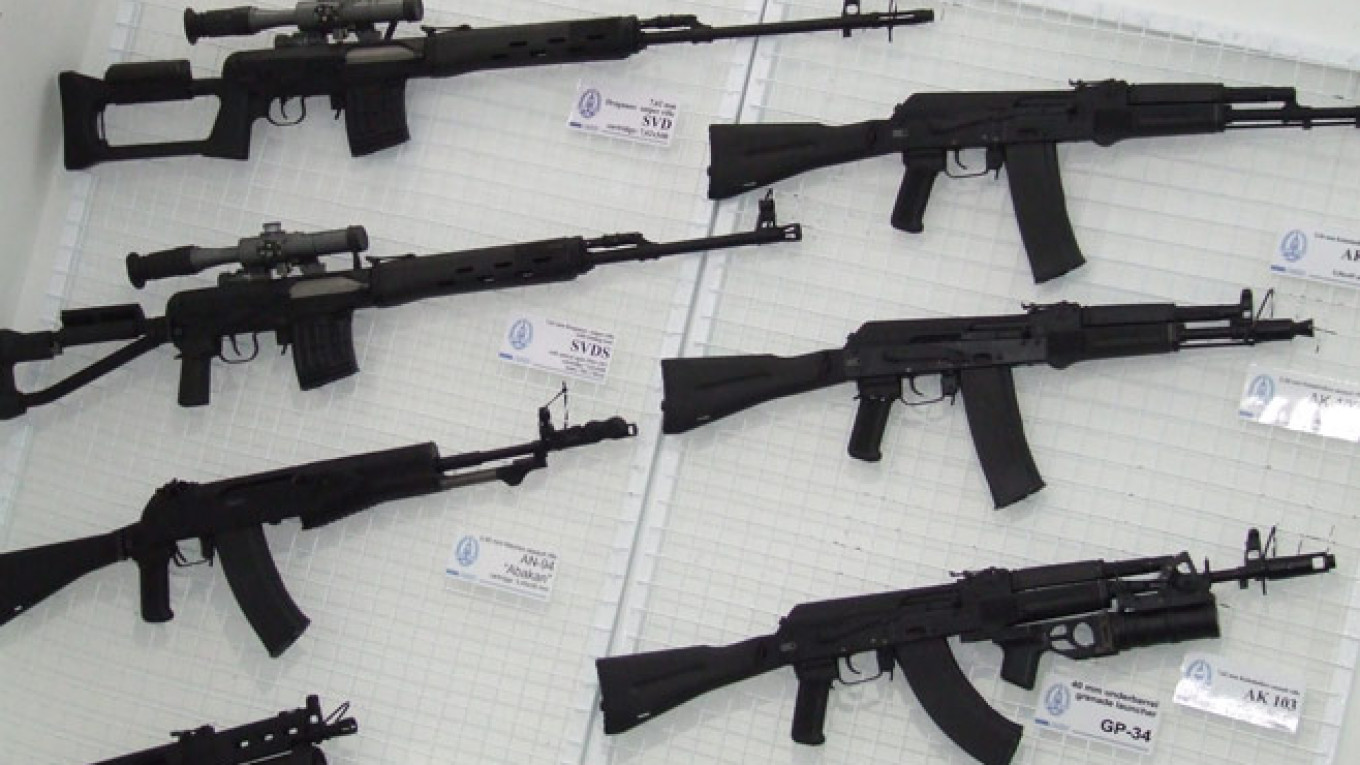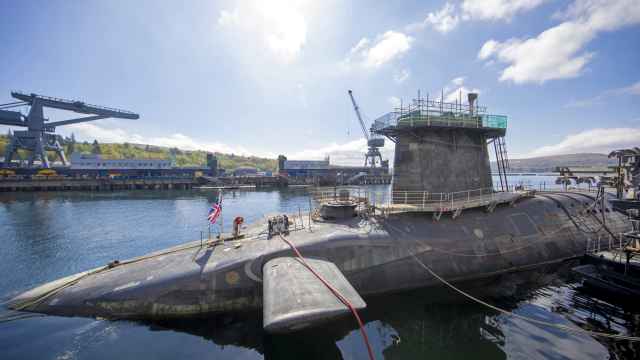Washington's recent blacklisting of Russian arms manufacturer Kalashnikov, maker of the world-famous AK-47 assault rifle, has riled some U.S. gun owners, who see the move not as part of U.S. pressure on Russia over its support of rebels in eastern Ukraine, but as an insidious means of curbing their Second Amendment rights to bear arms.
Ryan Peterson, a gun store owner in San Francisco, said his customers have rained criticism on the administration's restrictions, which block imports of Russian-made Kalashnikov weaponry to the U.S.: "The sentiment is that this has nothing to do with Russia, but is really just another back-door attempt for [U.S. President Barack] Obama to make guns harder and more expensive to obtain," Peterson said.
According to this line of thinking, he added, "the thing in Russia is just a convenient excuse for him to put another dagger in the heart of the Second Amendment. He knows that the 'ban' causes panic and price shock in the industry, which is his real goal."
Peterson said that while he does not completely buy the theory, it is the most common explanation floated in his shop since the administration announced a third round of sanctions against Russian individuals and companies on July 17, four months after Russia annexed Crimea from Ukraine to set off its biggest confrontation with the West since the Cold War. Since grabbing Crimea, Russia has supported separatists in eastern Ukraine in an armed conflict against the Western-backed government in Kiev.
The conflict has sparked a humanitarian crisis as civilians have been caught in the firing lines between Kiev's forces and the Russian-backed rebels. Last month, a passenger plane filled with mostly European citizens was downed over the conflict zone.
However, allegations of misconduct against the Obama administration are not limited to casual showroom conversations between firearms enthusiasts — a group well known for beating back any infringement on their right to bear arms.
Not long after Kalashnikov's inclusion on the U.S. sanctions list was announced, the National Rifle Association, or NRA, the largest pro-gun lobby in the U.S., released a statement expressing its concern over the measures.
"While ostensibly a measure to curb aggression by some in the Russian Federation, the move does bar from importation firearms that gun control supporters have long sought to ban," the statement said.
While the NRA recognized that sanctions can play a legitimate role in advancing U.S. Foreign policy interests, "in this instance the extent to which these actions coincide with the stated domestic policy goals of gun control supporters is more than a little unsettling," the statement continued.
The NRA refused to give further comments for this article.
Expansion Cut Short
However valid the concerns of gun owners may be, sanctions against Kalashnikov will hit the company. The U.S. is already Kalashnikov's biggest civilian weapon export market, and the company has aggressively targeted the country as a source of future revenue.
Civilian sales are increasingly important for Kalashnikov. Orders from the Russian military are not consistent, and production lines need to be kept running, The New York Times reported in 2012. On top of that, Russia's armed forces are looking to move away from the older Kalashnikov rifles in favor of more modern rifle designs from other manufacturers.
In a statement published on June 17, Kalashnikov said that Washington's decision was "contrary to the interests of U.S. consumers." According to the company, demand is so high in the U.S. that pre-orders for civilian assault rifles exceed current of annual delivery volumes by 300 percent.
In January, Kalashnikov moved to capitalize on this demand by signing an exclusive distribution agreement with the North America-based Russian Weapons Company, or RWC. The deal would see up to 200,000 civilian Kalashnikov rifles exported to North America annually.
The Moscow Times was unable to reach RWC for comment on how the sanctions will impact these plans before going to press.
Kalashnikov Clones
Not everyone is concerned about the Kalashnikov sanctions, however. Steve Thomson, owner of the Toledo, Ohio-based Adco Firearms shop, does not stock many Kalashnikov rifles, "as they are traditionally poor quality bullet hoses." Sanctions against the company are a waste of time anyway, he said, since there is a thriving market for non-Russian-made Kalashnikovs.
There are a variety of alternatives for buyers looking to get their hands on an AK, according to Jim Weishuhn, owner of the Erie Ordnance Depot, which specializes in selling Kalashnikov rifles.
"I am most likely going to upset some purists and Russians by saying that [Mikhail] Kalashnikov himself was rumored to have said the Bulgarians make the best AK, and the Bulgarians are happily producing them for the U.S. market — as well as the Poles, Hungarians, Romanians and Serbs," Weishuhn said.
The Soviets seeded their Warsaw Pact allies with production facilities for Kalashnikov rifles as a means to ensure that the alliance used similar calibre ammunition and parts. Copyrights today do not apply to anything other than the Kalashnikov brand name, and the design itself is old enough to have outlived any patent claims on the Avtomatik Kalashnikova mechanism that the rifles are based on, Weishuhn explained.
Indeed, "the U.S. market is beginning to produce 100 percent U.S.-made Kalashnikov clones," he added.
China also sells its own Kalashnikov copies, but these have have become a rarity on the U.S. market since the arms embargo against China in 1991, a fate that may be shared by Russian Kalashnikovs if sanctions become a long-standing feature of U.S.-Russia relations.
"The only thing the Russian AK has going for it over any other AK is the fact that is says 'Made in Russia' and has its particular factory markings on it. Currently the Poles are making very nice AK rifles and the Serbs are competing with the Romanians in price. The Romanians are producing the bottom tier as far as quality is concerned. Perhaps the sub basement of quality," Weishuhn said.
In fact, Russia itself has several non-Kalashnikov factories that produce AK rifles. Izhmash, the producer of the popular Saiga AK rifles for Kalashnikov — which is owned by sprawling state-owned corporation Rostex — is merely the most well known. U.S. customers will still be able to purchase Russian AKs from Molot — which produces the high-end Vepr line of Kalashnikov rifles. The standard 7.62x39mm ammunition used by AK designs can still be purchased from the Tula Arms Plant.
Contact the author at bizreporter@imedia.ru
A Message from The Moscow Times:
Dear readers,
We are facing unprecedented challenges. Russia's Prosecutor General's Office has designated The Moscow Times as an "undesirable" organization, criminalizing our work and putting our staff at risk of prosecution. This follows our earlier unjust labeling as a "foreign agent."
These actions are direct attempts to silence independent journalism in Russia. The authorities claim our work "discredits the decisions of the Russian leadership." We see things differently: we strive to provide accurate, unbiased reporting on Russia.
We, the journalists of The Moscow Times, refuse to be silenced. But to continue our work, we need your help.
Your support, no matter how small, makes a world of difference. If you can, please support us monthly starting from just $2. It's quick to set up, and every contribution makes a significant impact.
By supporting The Moscow Times, you're defending open, independent journalism in the face of repression. Thank you for standing with us.
Remind me later.






